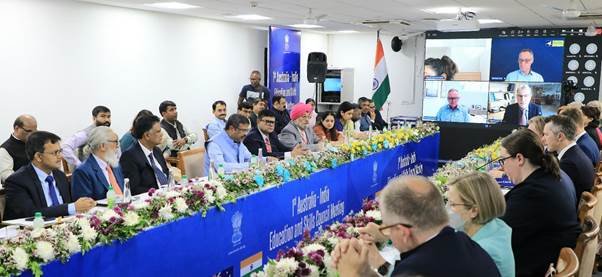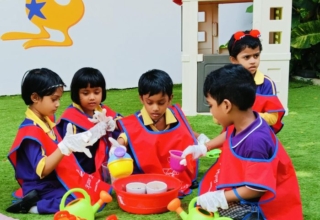
By Autar Nehru
Gujarat’s ‘not so chic’ GIFT city early this week witnessed a high profile Arambh (The Beginning) event to make the formal announcement of the opening of (branch) campuses of two leading universities from Australia—Deakin University and University of Wollongong in this specially provisioned India’s first International Financial Services Centre (IFSC) under Special Economic Zone Act, 2005. And this was quickly followed by one of these universities making an announcement for commencement of a couple of Masters programs from next year’s academic session 2024.
All this good news coming in the backdrop of a leading national digital news platform describing the dream GIFT City as ‘a lifeless ghost town’ owing to its sluggish transformation into a happening urban space with life, in a report some days ago, is still historic and a new injection orbit for internationalization of education in India. The forward journey of this beginning will in several ways set the trend for ‘Education’ vertical of the Gujarat International Finance Tec-City and indeed India readying to welcome foreign FEIs pending regulation approvals.
From Vilyat (as Britain was referred to in pre-1947 India) to GIFT city, India’s obsession and aspiration for overseas education has remained intact and actually grown considerably with the growing size of upper middle class. All projections tell that India will lead the world in sending international students for many years. Last year (2022) saw 8.5 lakh (0.85 million) Indian students going to top four destinations of USA, UK, Australia and Canada. alone. In fact, India has been in this model and cycle for very very long time. But, even if these numbers continue to grow substantially, still it is akin to a drop in the ocean as the country’s need for quality higher education is simply quite huge. So, a culture of in-bred internationalization in the education systems to address both the growing student aspirations and quality has come as a potential solution.
Actually, the National Education Policy 2020 is opening advocating this shift and the process of finding pathways to integrate internationalization in works for several years in the past are being formalized under the new mindset change. Mechanism for the Mutual Recognition of Qualifications already in place in some countries, Twinning and Dual Degree programs between Indian HEIs and foreign partner HEI, joint research partnerships, exchange program for short courses, professional learning are part of international collaborative stream in higher education which is a vast upgrade from simple exchange programs. “This transformative policy emphasizes ‘Internationalization at Home’, aiming to create a vibrant, diverse, and inclusive educational environment within our own country,” said Dharmendara Pradhan India’s Education and Skills minister at the GIFT event.
The twinning program between IIT Madras and The University of Birmingham for their new Joint Masters programmes in Data Science and Artificial Intelligence, has opened a new chapter in the nature of these partnerships and may actually set an example for a new pathway with more acceptance and success. It is one of the well-laid meaningful collaborations where both partners feel committed and equal.
Earlier most of the Indian universities and colleges more so the private ones, would enter into partnerships for a limited objective and use it for showcasing to impress aspirant students and their parents, but now solid models are building in the country. Actually, some observers optimistically feel that India own IoE (institutions of eminence) category universities will set examples for others to copy and in coming decade India’s own higher education landscape will be dotted with excellence and confidence on the world stage.
India’s policy makers have also woken up to country’ hidden and wasted potential and are busy devising technological ways to address it. This is to say that the interest and emphasis on education and skilling is being seeded at a never seen scale. National Educational Alliance for Technology (NEAT) under AICTE is developing tools to reach those learners who are outside the systems sitting idle, not learning or not in employment and this number would be huge. It has developed a translation tool called anuvadhini, which can translate complete paragraphs, image texts, videos. This and many other technologies are being tested to wake up the potential of nearly 80% population of the country who don’t have English language skills. And this translation tool isn’t confined to Indian languages but can translate from and to many international languages. All this is going to open up a lot of opportunities for international linkages and collaborations in future years.
Education and skills are emerging as a primary and priority area of country’s bilateral engagements and in future will remain an area of focus for the Government. The traditional recruitment segment of students from India comprising of hundreds of study-abroad consultants and international education offices of English-speaking popular education destinations coupled with rising popularity of IB schools, project-based learning and school education gradual but determined shift to competency-based education, everything points to growth of internationalization mindset in India. Tier 2 and Tier 3 cities are now contributing significantly to number of students from India going overseas for studies.
India’s own strategy for making India an international destination also got some wings after the 5-yer old Study in India programme is showing some signs of maturing by reaching out to international students by selling India’s mix of society and tradition, and the standard yet budgeted higher education.
As education systems become universal with more hub and spoke models due to digital and emerging IT technologies coupled with ease of mobility, breaking the barriers and credit transfers, India engagement with translational education will deepen in coming years. And GIFT City will hopefully turn into a model not just for India but for the world.










